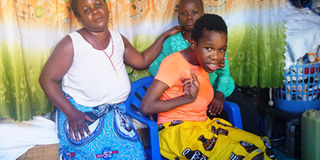How single mothers are struggling to make ends meet during lockdown

Making ends meet: Despite economic effects of Covid-19, single mothers are have had to make tough decisions to fend for the children. Photo by Phionah Nassanga.
What you need to know:
Rising above limitations. The economic effects of Covid-19 are evident, especially among low income earners such as single mothers, who live from hand to mouth. To many, what was once simple now feels difficult. What was already difficult feels impossible. Phionah Nassanga spoke to single mothers to find out how they are coping amidst the crisis .
W hen she got married at the age of 18, Rose Namutebi thought she had found someone with whom they would spend the rest of their lives together.
She was also ready to become a mother and start a family she had always dreamt of.
She says the first years of her marriage were filled with joy and everything worked out perfectly. She says her husband then was a good man who celebrated life’s little milestone.
Although Namutebi and her husband were not from well-to-do families, she hoped that with concerted efforts, they both would build wealth as a family. Little did she know she was building castles in the air.
“In 2013, our third born daughter, who was five years then, suffered from acute malaria, which affected her nervous system. I could not imagine that my once walking and playful daughter had become lame. My husband asked me to abandon the child in hospital,” says Namutebi.
Days later, Namutebi, with teary eyes says, her husband left and has never returned.
Striving to survive
Because of the rejection she suffered from her husband and in-laws, Namutebi decided to do whatever it took to fend for her four children on her own, her daughter’s condition notwithstanding.
Finding a job did not come easy but she later was hired as a night shift road cleaner a long Entebbe road. Her contract, however, did not last. Juggling a number of jobs, Namutebi resorted to washing clothes for money and cleaning in one of charity homes that looks after disabled and elderly persons.
However, as a result of the Covid-19 pandemic, many people are at home doing their own laundry and even the charity home where she was working, asked her to stay home untill further notice.
Namutebi says the whole support system she had put in place to keep her and her children going has completely fallen apart.
“I was not earning much, but I would pay rent and provide basic needs for my children. This is no more. Only God knows how we shall survive,” she laments.
Good Samaritans
In between caring for her daughter and trying to figure out how to meet her bills, everything has gone from bad to worse for Namutebi. Worried about her only daughter, the mother of four survives on the mercy of friends and neighbours.
“When one of my neighbours cook before I do, they give my daughter food because unlike her other siblings, she is impatient when she is hungry,” she says.
At the moment, Namutebi’s prayer is that her children do not fall sick because she cannot afford hospital bills.
The going gets tough
The low paying jobs which kept many women working and earning are no more and single mothers like Namutebi, cannot afford to have three meals a day. For Namutebi, this means one meal a day, taken at 6pm. The rest of the day, she sips from a mug of dry tea without sugar.
Pauline Nakawuki, 36, is another single mother of six, aged seven to 18. Unlike Namutebi, Nakawuki is surviving from her vegetable stall that stands a few metres off the road in Kitebi, Rubaga division.
Before the lockdown, Nakawuki could sustain her family. Everyday, with income from her stall, she had hopes to provide basic needs for her children.
No means of transport
However, that is no more because from the time public means of transport were grounded, she decided to turn her stall into her other home.
“From my place of work to my home in Buloba, the distance is about five kilometres. I could not walk every single day to work. Also staying at home meant starving,” she expresses.
Being the breadwinner, Nakawuki had no option but to make tough decisions. She decided to leave her young ones into the hands of her elder son.
Like any mother, Nakawuki would love to be near her children and take care of them. However, she has no choice, but to spend cold nights with a leaky roof over her head in order to raise money to send back home for her children’s food.
Before the pandemic, her 18-year-old son was working as a turn boy at a village hardware outlet in Buloba, where he was earning between Shs3, 000 to Shs5,000 daily. However, today her son is at home, unable to work. Her only prayer is that none of her children fails sick during this time and in her absence. She says: “Ever since the lockdown was announced, I have gone back home only once. I only make phone calls to their elder brother who updates me on their wellbeing.”
Against all odds
Being the breadwinner, Nakawuki, had no option but to make tough decisions. She decided to leave her young ones in the hands of her elder son.
Like any mother, Nakawuki would love to be near her children and take care of them. However, she has no choice, but to spend cold nights with a leaky roof over her head in order to raise money to send back home to her children to buy food. Just like Namutebi and Nakawuki, many single mothers are struggling to feed their children, to pay rent and ensure utility bills are paid.




